UH 60 Helicopter: Advanced Avionics and Combat Solutions
UH 60 Helicopter: Advanced Avionics and Combat Solutions
Blog Article
The Effect of Lasting Practices on the Future of Airplane Operations and Emissions Reduction
As the aeronautics industry faces increasing analysis over its ecological impact, the fostering of sustainable techniques emerges as a crucial pathway towards future aircraft procedures and emissions reduction. Innovations in lasting air travel fuels and developments in hybrid propulsion innovations stand at the center of this makeover, appealing significant decreases in greenhouse gas emissions. Nonetheless, the successful combination of these campaigns hinges on a range of variables, including regulative structures and sector partnership. The inquiry remains: how will these progressing practices reshape the dynamics of air travel and contribute to a much more sustainable future?

Summary of Lasting Practices
Lasting techniques in aircraft procedures incorporate a range of techniques intended at minimizing ecological influence while preserving operational efficiency. These practices are vital in the aviation sector's dedication to decreasing its carbon footprint and adhering to international environmental standards. Key efforts include maximizing flight courses to reduce fuel intake, boosting maintenance methods to make sure aircraft operate at peak efficiency, and applying sophisticated innovations such as winglets and light-weight products that improve the rules of aerodynamics.

Involving and educating personnel on sustainability techniques likewise play an essential duty, cultivating a culture of ecological responsibility within companies. Overall, the assimilation of these lasting methods not just helps in reducing emissions however likewise improves the long-lasting stability of the air travel sector, ensuring it meets the needs of both consumers and governing bodies while contributing to worldwide sustainability goals.
Innovative Fuel Alternatives
Many ingenious gas alternatives are emerging as pivotal remedies to minimize the aeronautics sector's dependence on typical nonrenewable fuel sources. Among these alternatives, Lasting Air travel Fuels (SAFs) have actually obtained significant interest because of their prospective to lower lifecycle greenhouse gas discharges by as much as 80% compared to traditional jet gas. SAFs are derived from various feedstocks, consisting of waste oils, farming residues, and also algae, making them a flexible alternative for the sector.
An additional appealing alternative is hydrogen gas, which, when made use of in fuel cells, creates only water vapor as a result. Furthermore, electrical propulsion systems are being discovered, leveraging battery technology to power aircraft.
Lastly, biofuels stemmed from biomass are being investigated, using a renewable option that can be blended with typical gas. Collectively, these cutting-edge gas alternatives stand for an important step towards accomplishing a sustainable aeronautics environment, straightening with global emissions decrease targets and enhancing the sector's ecological stewardship.
Technological Advancements in Aviation

Exactly how can technical innovations reshape the future of air travel? Developments such as electrical and hybrid propulsion systems are at the leading edge, promising considerable reductions in gas intake and greenhouse gas discharges.
In addition, the implementation of innovative products, such as lightweight composites, contributes to boosted the rules of aerodynamics and fuel efficiency. Using expert system and equipment learning in flight operations optimizes course preparation and minimizes fuel Continue burn by enabling real-time adjustments based upon weather and web traffic conditions. Additionally, the advancement of independent and from another location piloted airplane systems stands to transform freight and guest transport, potentially boosting performance while reducing human mistake.
Moreover, lasting air travel modern technologies, consisting of innovative air web traffic administration systems, can lower and enhance operations blockage, causing lower exhausts throughout trip. These advancements jointly stand for a paradigm change in aeronautics, assuring a future where sustainability and functional efficiency are intertwined, consequently supporting the sector's commitment to minimizing its environmental effect.

Governing Framework and Conformity
Because of the growing emphasis on environmental stewardship within the aeronautics field, the regulatory structure controling airplane procedures is evolving to promote lasting practices. Regulatory bodies, such as the International Civil Aeronautics Organization (ICAO) and different nationwide air travel authorities, are presenting rigorous guidelines focused on lowering exhausts and enhancing operational effectiveness.
These regulations commonly consist of the adoption of Lasting Aeronautics Fuel (SAF), which has actually been identified as an essential component in attaining lower carbon footprints. In addition, compliance with these laws requires airlines to execute operational techniques and sophisticated innovations, such as optimized flight courses and enhanced air website traffic administration, to decrease fuel usage.
In addition, the enforcement of exhausts trading schemes and carbon offsetting initiatives is coming to be progressively prevalent, engaging airline companies to keep an eye on and report their exhausts properly. Non-compliance can cause considerable penalties, hence pressing drivers to focus on sustainability in their company models.
Eventually, the advancing regulatory landscape not only drives advancement and financial investment in environment-friendly technologies however additionally fosters a society of liability within the aviation market. As these frameworks remain to establish, the emphasis on sustainable methods will certainly be indispensable to achieving the market's long-lasting environmental goals.
Future Patterns in Aircraft Procedures
As the aeronautics sector adapts to a significantly strict regulatory atmosphere, future trends in aircraft procedures are set to concentrate on ingenious services that additionally enhance sustainability and effectiveness - uh 60. Secret advancements will likely include the see this adoption of innovative air traffic monitoring systems, which use real-time data and artificial intelligence to enhance flight paths, reducing gas intake and emissions
One more significant fad is the enhanced assimilation of lasting air travel fuels (SAFs) These alternatives to standard jet fuel, originated from sustainable sources, can dramatically decrease lifecycle greenhouse gas exhausts. The industry's dedication to SAFs will likely increase as airline companies collaborate with gas manufacturers to make sure availability and cost-effectiveness.
In addition, the press towards electrification and crossbreed propulsion systems is gaining momentum. Arising aircraft designs will incorporate these technologies, providing quieter and much more reliable operations, specifically for short-haul trips.
Verdict
The adoption of lasting aeronautics gas, paired with innovations in electric and hybrid propulsion systems, is vital for lessening lifecycle greenhouse gas exhausts. Enhancing flight courses and welcoming innovative innovations contribute to a quieter and extra ecologically pleasant aviation industry.
Developments in lasting aviation fuels and advancements in hybrid propulsion innovations stand visit this website at the forefront of this makeover, appealing substantial reductions in greenhouse gas exhausts.Countless ingenious fuel choices are emerging as critical remedies to lower the air travel market's reliance on traditional fossil gas - uh 60. Among these alternatives, Sustainable Aeronautics Fuels (SAFs) have obtained substantial interest due to their prospective to lower lifecycle greenhouse gas emissions by up to 80% contrasted to conventional jet gas.One more significant trend is the raised integration of lasting aviation gas (SAFs) The adoption of sustainable air travel gas, coupled with developments in hybrid and electrical propulsion systems, is crucial for minimizing lifecycle greenhouse gas discharges
Report this page